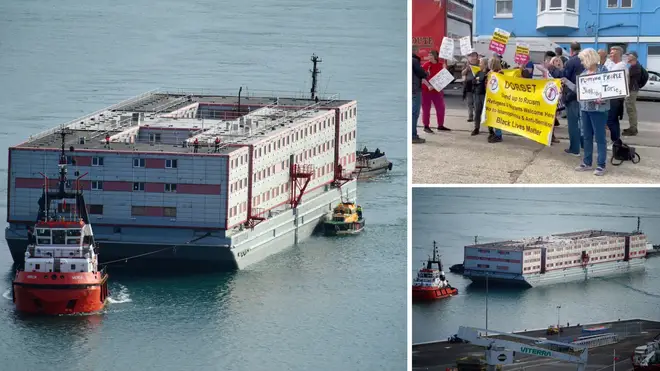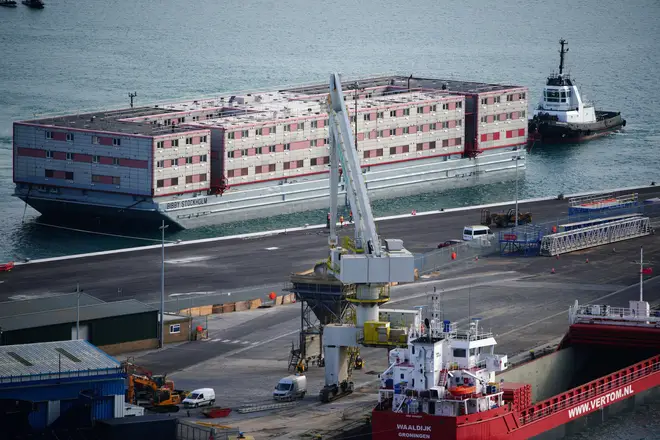
Oli Dugmore 4am - 7am
18 July 2023, 08:17 | Updated: 18 July 2023, 09:35

A controversial barge that is set to accommodate 500 asylum seekers has arrived in Dorset.
The Bibby Stockholm, a three-storey, 93-metre long accommodation vessel, is capable of housing up to 500 migrants. The first asylum seekers are expected to board the vessel in the popular seaside resort later this month.
It set sail from Falmouth in Cornwall yesterday to its final destination of Portland, near Weymouth. But the move has triggered protests from locals who are fearful about the impact the new arrivals will have on the town's community.

Asylum seeker barge finally docks in Portland

Bibby Stockholm: Protests greet asylum seeker barge at Portland
Its arrival in Dorset - which has been opposed by the local MP and residents - comes hours after the government's illegal migration bill passed the Lords.
This morning a crowd of people were seen holding signs saying "no the the barge", "Portland Port betrays Portland" and "Portland betrayed" as they awaited the vessels arrival. Local politicians have slammed the plans as 'cruel and unusual' adding that the community does not have the right infrastructure to house more people in the area.
Downing Street has defended the use of barges to house migrants - insisting it is a cheaper alternative to accommodating them in hotels.

Read More: Stop the boats? How Andrew Marr would tackle the migrant crisis
Rishi Sunak's official spokesman said: "I think it's right for the public as a whole that we move away from a situation where £6m a day of taxpayers' money is going towards housing these individuals in hotels.
"That's not a good use of money and obviously that puts unplanned pressure on local areas as well.
"We think it is better to open specific sites designed to house immigrants that come in, done in a more planned way.
"That's what we are seeking to do with the Bibby Stockholm and that's what we're seeking to do in other parts of the country - opening up sites to take the pressure off local areas and to reduce the cost."
Controversial plans to tackle the small boats crisis are poised to become law after the Government crushed a series of renewed challenges by peers at Westminster.
In a night of drama, the Tory frontbench saw off five further changes being sought by the unelected chamber to the Illegal Migration Bill, including modern slavery protections and child detention limits.
At least one other vote was ditched in the face of the Government victories.
And Archbishop of Canterbury, Justin Welby, who has been a strident critic of the Bill, also dropped his demand for a statement on tackling the refugee problem and human trafficking to the UK, after a similar proposal was rejected by MPs.
It marked a shock ending to the parliamentary tussle over the flagship reforms that had threatened to go to the wire ahead of the summer recess.
The cessation of the stand-off between the unelected chamber and MPs during so-called ping-pong, where legislation is batted between the Lords and Commons until agreement is reached, paves the way for the Bill to receive royal assent.
The reforms are a key part of Prime Minister Rishi Sunak's bid to deter people from making hazardous Channel crossings.
They will prevent people from claiming asylum in the UK if they arrive through unauthorised means and the government also hopes the changes will ensure detained people are promptly removed, either to their home country or a third country such as Rwanda, which is currently the subject of a legal challenge.
But the Bill had encountered fierce opposition in the upper chamber, which had been accused of trying to "drive a coach and horses" through the contentious plans.
Home Office minister Lord Murray of Blidworth said the number of small boat arrivals had "overwhelmed" the UK's asylum system and was costing taxpayers £6 million a day to provide accommodation.
He told peers: "With over 45,000 people making dangerous Channel crossings last year this is simply no longer sustainable.
"If people know there is no way for them to stay in the UK, they won't risk their lives and pay criminals thousands of pounds to arrive here illegally.
"It is therefore only right that we stop the boats and break the business model of the criminal gangs exploiting vulnerable people, ultimately enabling the Government to have greater capacity to provide a safe haven for those at risk of war and persecution."
He urged the Lords to "respect the will of the elected House and the British people by passing this Bill".
But while he agreed on the need to stop the small boat crossings, Mr Welby said: "I fail to see how this (the Bill) does it and I have not heard anything to convince me.
"But that is the view of the other place. I agree that in the end on most things except the most essential that this House must give way to the other place."
He added: "The problem with the Bill is that it has not started at the right place. Where it needed to start with is... to have a level of national consensus and agreement on what the aim of our migration policy and immigration policy is in the long-term."